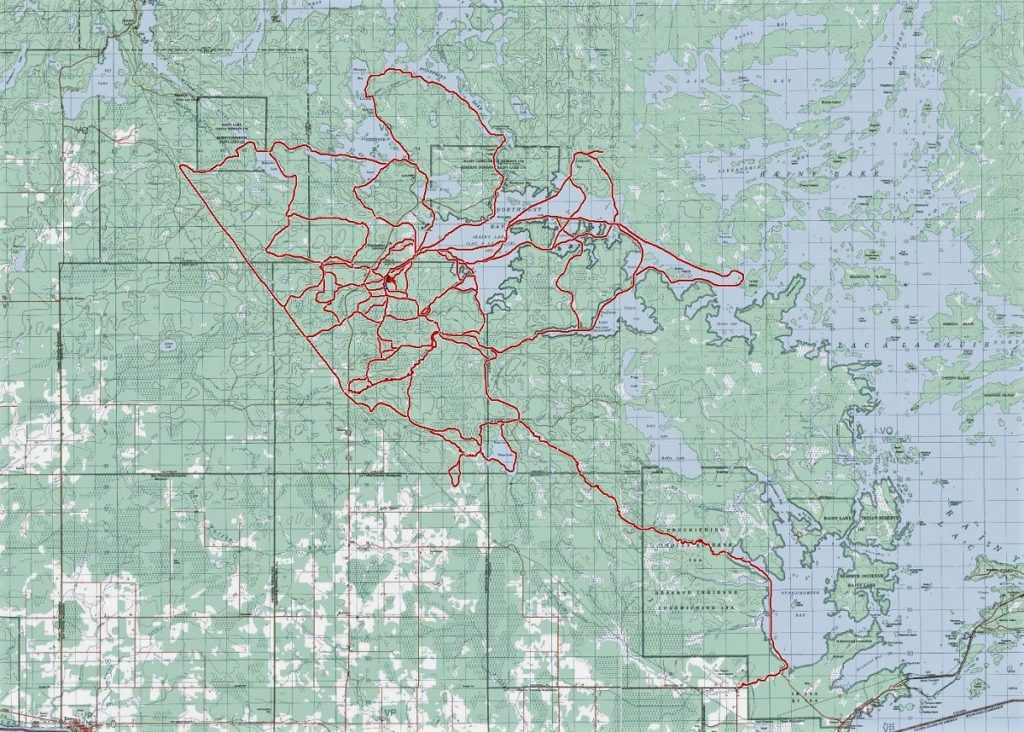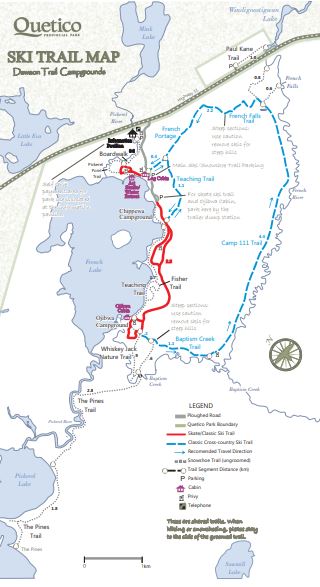Cross-Country Skiing
Rainy River District is blessed (cursed?) with a continental climate guaranteeing a long, cold winter without the worry of a warm chinook suddenly raising the temperature and turning beautiful snow, perfect for skiing or snowshoeing, into ice. Average snow accumulation is about 145 cm annually, with snow falling on average during 36 days for the Fort area, and 225 cm and 80 days for Atikokan. Snow can (and has) fallen any time from September through May but normally falls from mid-November to mid-March.
Winter typically begins in November in Fort Frances, with average temperature fluctuating between -8C and 1C. December average temperature range between a high -7C and low -17C. January is both the snowiest and coldest month with an average high of -10C and an average low of -21C. The largest daily snowfalls, however, are usually seen during February and March, with the greatest depths occurring in those months. February is only slightly warmer than January, with an average high of-5C and a low of -18C. March brings even warmer temperatures ranging from 1C to -11C. By the end of March snow conditions on land begin to deteriorate, although skiable snow can remain well into April certain years. Skiing usually remain excellent on lakes well into April, although day time melting will often make the surface quite icy. Temperatures in Atikokan tend to be two to three degrees colder than Fort Frances throughout the winter.
At the completion of each decade, Environment and Climate Change Canada updates its climate normals for as many locations and as many climatic characteristics as possible. The last available summaries are from 1981 to 2010 for Fort Frances and 1971 to 2000 for Atikokan. Available data for temperature and snowfall 1951 to 2010 for the two localities can be found here. Additional weather data for all locations in Canada can be found here.
Atikokan and Quetico Provincial Park
The Beaten Path Nordic Ski Trails is an active cross country ski and snowshoe club whose volunteers have created over 35 km of groomed trails for skate and classic skiing within five minutes of Atikokan. The club also maintains 5 km of groomed trails at the Dawson Campground in Quetico Provincial Park, 25 minutes from Atikokan. The park also has several km of wilderness trails. Membership fees for 2020-2021 were $210 for families and $105 for individuals with reduced fees for seniors, students, and early registration. There is also an additional $10 Capital Fee and $21 Insurance Fee. Daily use fees for non-members are $15. There is also a separate $15 daily use fee for Quetico Park.
Membership forms can be found (by scrolling down) on the Beaten Path Nordic Trail Facebook page
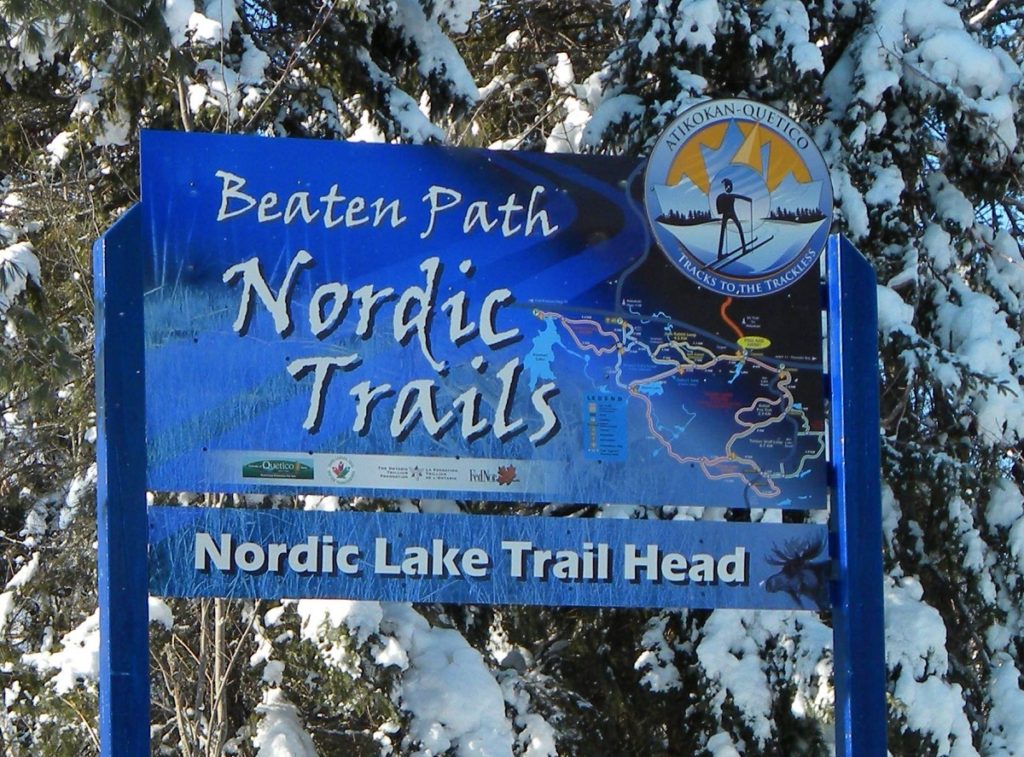
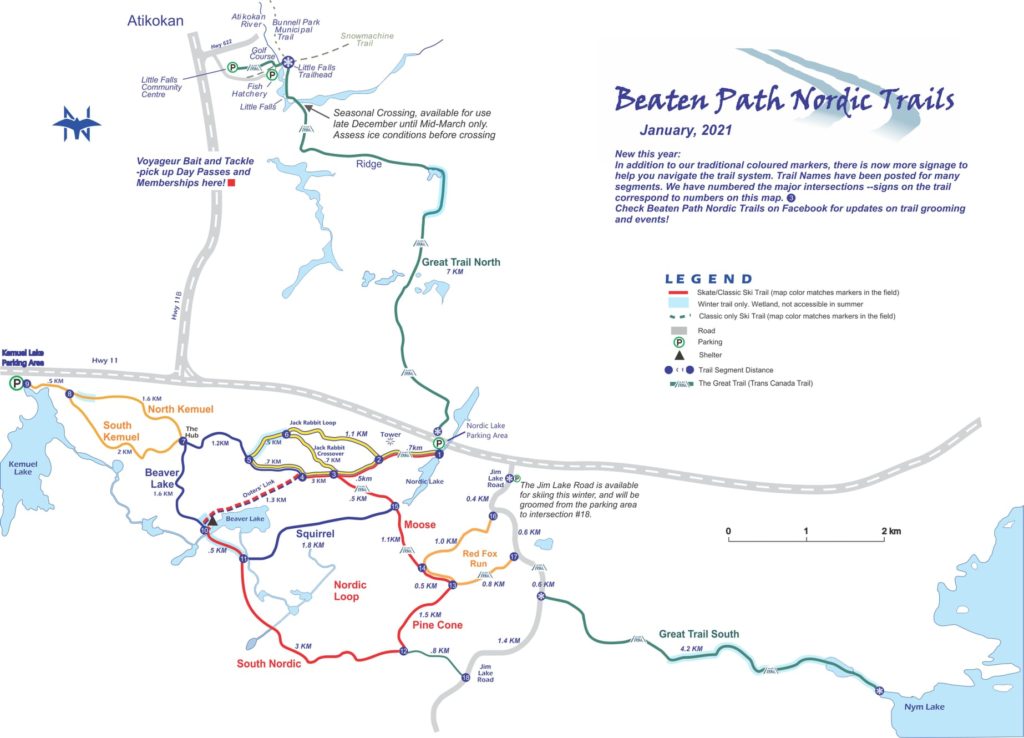
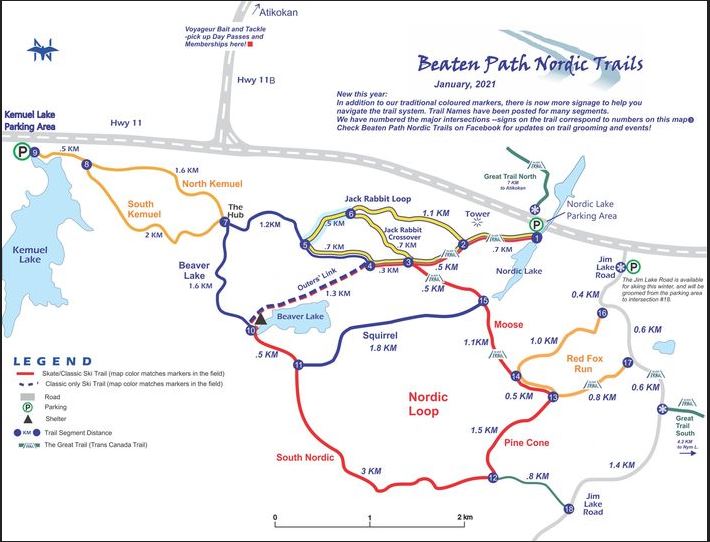
Fort Frances
Fort Frances is fortunate to have two areas with groomed trails, both for skiing and snowshoeing , the 8th Street Trails and the trails at Rocky Inlet, both maintained by volunteers, the latter by members of the Rainy Lake Nordic Ski Club.
8th Street Trails
There are about 5 km of groomed trails and several km of walking/snowshoeing trails. The entrance to these trails is immediately across from the Rainycrest Long Term Care Centre. There is no fee to use the trails.
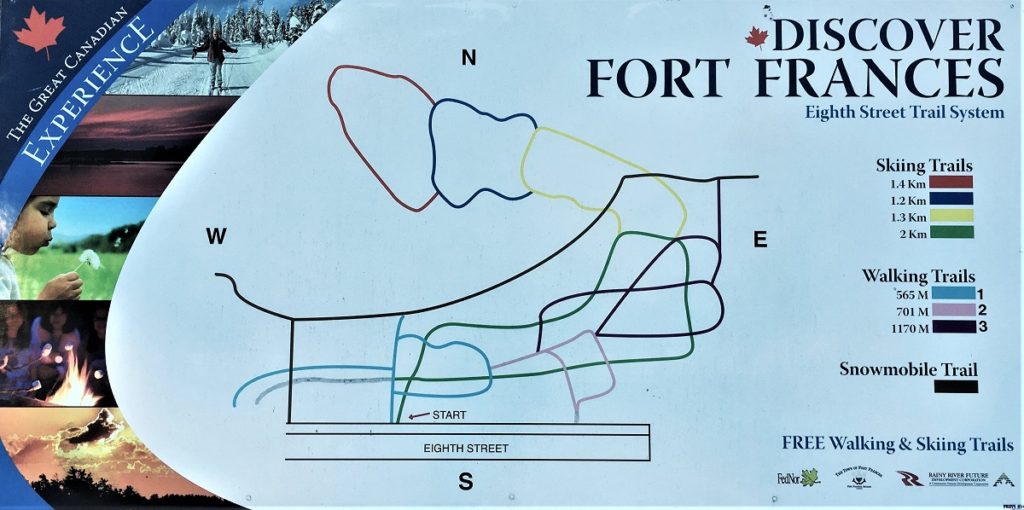
Rocky Inlet Trails
The Rainy lake Nordic Ski Club maintains 15 km of groomed trails for both classic and skate skiing, as well as 5 km of snowshoe trails. The trails wind through beautiful oak, aspen, red pine, and jack pine forests.
The trails include three main ski loops groomed with skate/classic tracks (intermediate level), and a new classic trail suitable for beginners groomed with side-by-side classic tracks. Average time to travel each loop varies from 35 minutes for the shortest trail to 90 minutes for the most challenging. The snowshoe trails system has four marked trails through the forest, around and over a beaver pond, and allows the user to enjoy moderate-difficulty snowshoeing. Trail junctions are well-marked.
The club has a modest quantity of ski and snowshoe equipment available for day use at a reasonable fee on a “first come, first served” basis.
Access is via Highway 11, east of Fort Frances Ontario. Follow George Armstrong Road to Rocky Inlet Road and travel approximately 1km.
Memberships are available at zone4.ca. Enter “Rainy Lake” in the search engine to find the club. There is a five step process to finish the registration. First enter your name and address, etc, and your category (adult, youth, child). The next step will be to add extra individuals one at a time, following the same process (assuming you are registering as a family, otherwise continue to the finish). You will need to read a waiver and acknowledge having read it before being allowed to continue. Ignore the extra fees at the bottom of the form; they are included in the club fee.
Membership fees are set at the Annual General Meeting. Presently they are:
$100 Adult
$75 Youth (13-18)
$30 Child
There is a 10% discount for registrations made prior to December 31. The registration process allows for the discount. There is no family rate.
Day use fee for non-members is $10. Sign the register and place money in the deposit box at the chalet. Equipment rental (including snowshoes) is a bargain – only $5 in addition to the daily fee. Members have free use of the equipment.
For current information refer to the Rainy Lake Nordic Ski Club Facebook Page. The club also has an Instagram page
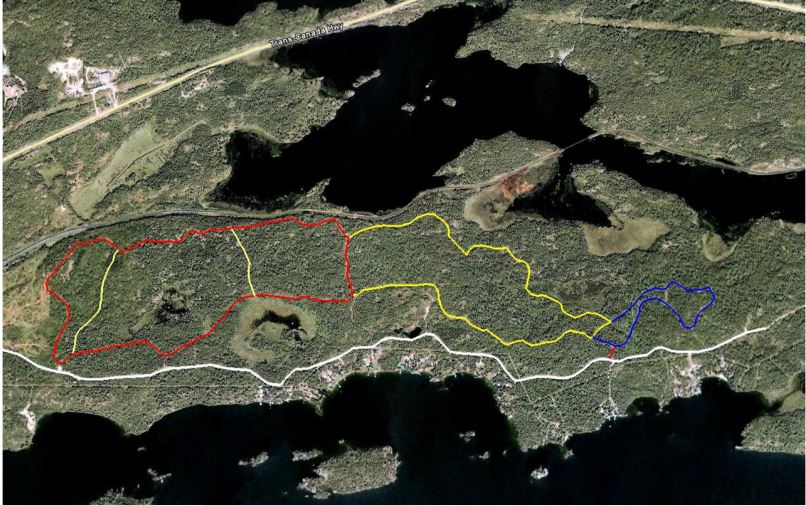
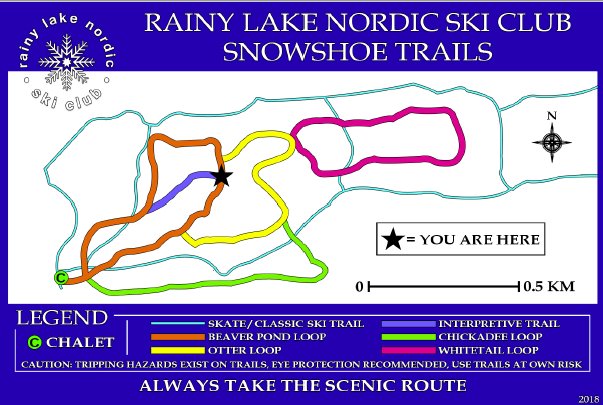
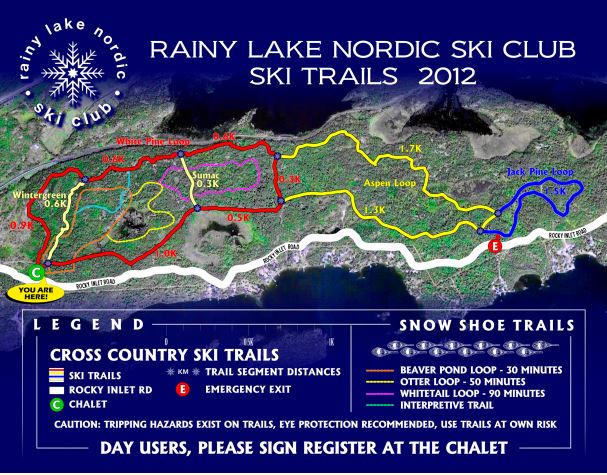
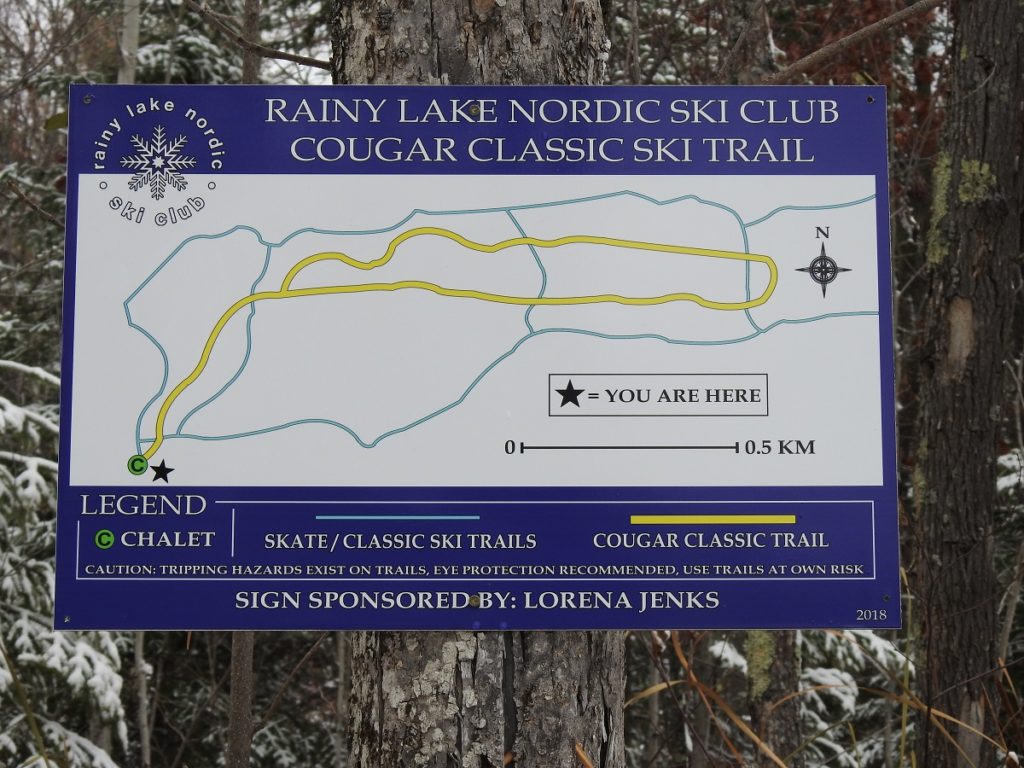
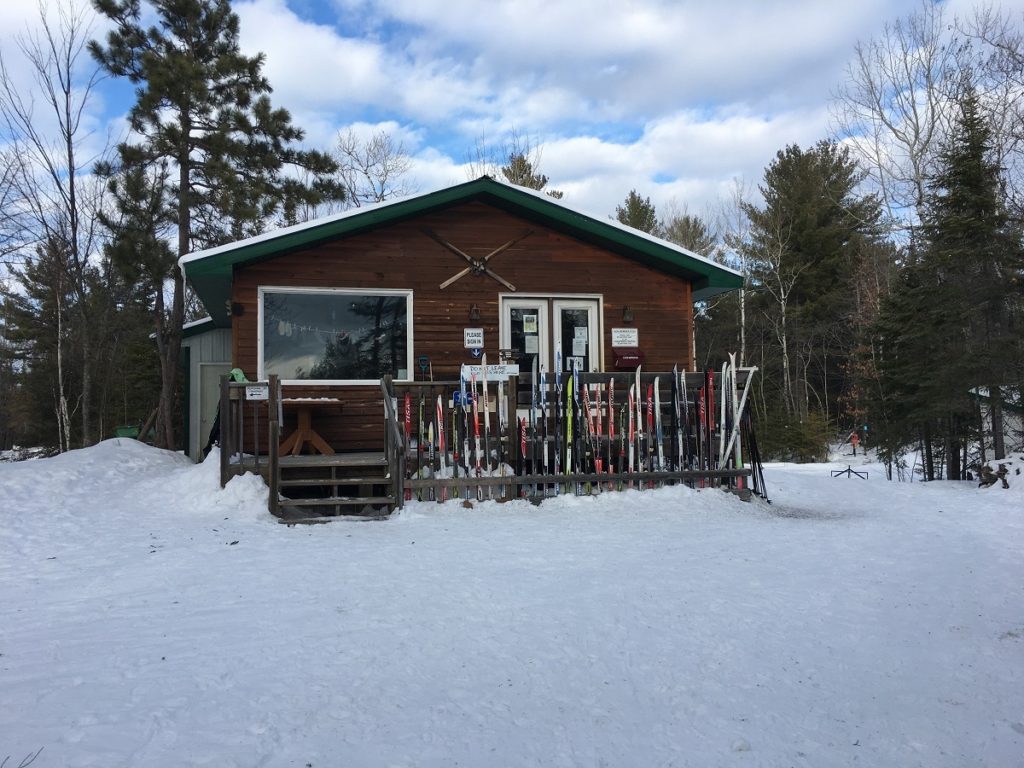
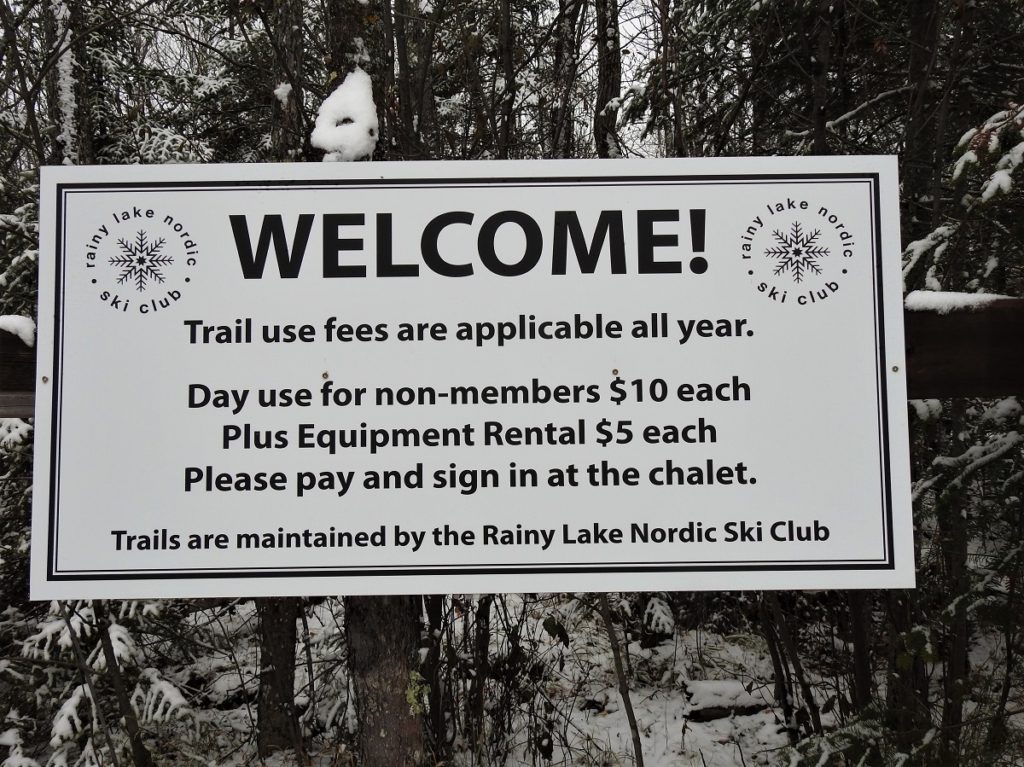
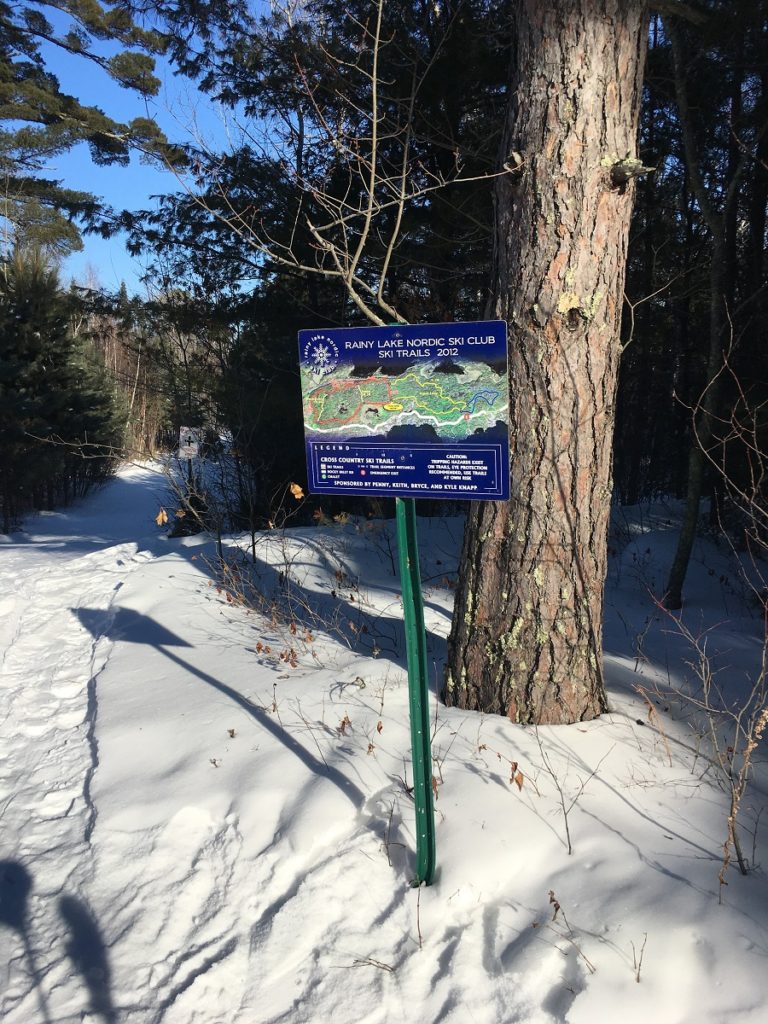
Kay-Nah-Chi-Wah-Nung (Manitou Mounds)
Kay-Nah-Chi-Wah-Nung (“place of the long rapids”) is one of Canada’s most significant centres of early habitation and ceremonial burial. The site contains at l east17 burial mounds and the archaeological remains of some 30 village sites. The mounds were built on river terraces along the north side of the Long Sault Rapids on Rainy River. The site was at the centre of a continent-wide Aboriginal trading network and is sacred to the Ojibway and to other First Peoples of North America. It reflects over 8,000 years of habitation by Archaic first peoples and present-day Anishinaabeg of Rainy River First Nations. It was designated a National Historic Site of Canada in 1969.
The Rainy River First Nations own and operate the site. On the grounds is an impressive visitor’s centre, which houses a significant collection of artifacts, offers interpretive tours, and is used as an educational resource for the area.
Kay-Nah-Chi-Wah-Nung also has ten kilometers of trail systems that are groomed for cross country skiing and snowshoeing. There is a nominal daily use charge to ski, and skis and snowshoes are available to rent. Further information, including contact information, is found on their website, https://manitoumounds.com/
Access is from Highway 11 onto Shaw Road near the town of Stratton.

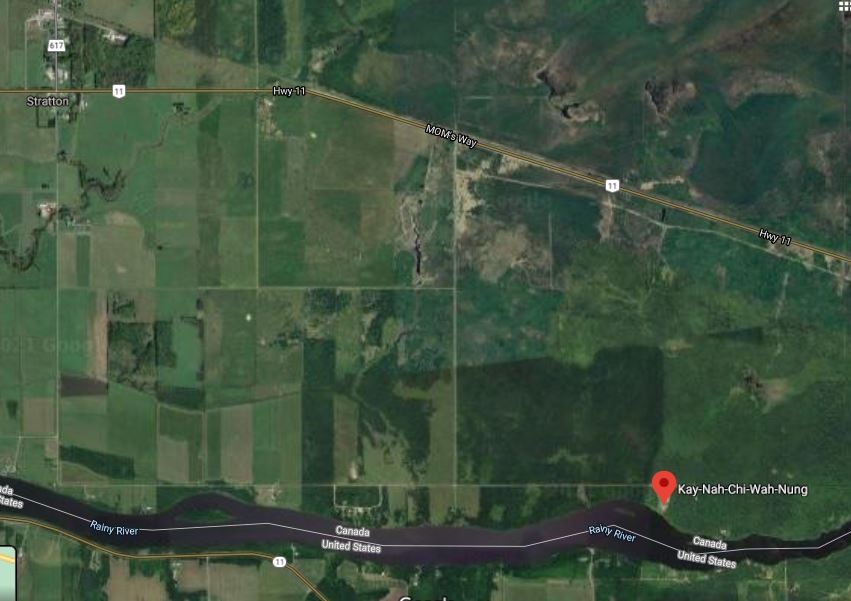
International Falls and Voyageurs National Park
The Polar Polers Ski Club in Interantional Falls maintains two trails for both skate and classic skiing, the Manka Trail, a one km loop in town, and the Tilson Creek Ski Trail, east of town on Highway 11. The Tilson Creek Trail system has about 16 km of trails in spread through 5 loops. A 1.6km trail connects to the Rainy Lake Visitors Centre in Voyageurs NP. The ski trail crosses open and forested bog and passes through stands of aspen, spruce, balsam fir and eastern white cedar. The terrain varies from flat bog to rolling uplands and steep rock ridges.
Tilson Creek Trail is a grant-in-aid trail and therefore requires a Great Minnesota Ski Pass if you are 16 or older. (This is required to ski on all groomed trails in Minnesota state parks or state forests, or on state or grant-in-aid trails). A daily pass is $10 and a yearly pass is $25. For information how to buy a Minnesota Ski Pass click here.
Entrance to Voyageurs NP is free, as are all the hiking and skiing trails in the Park.
The Black Bay ski trails in Voyageurs Park are accessed from The Rainy Lake Visitor Centre by a 1.6km crossing of Rainy Lake. Approximately 12 km of groomed trails.
There are also other ski and snowshoe trails accessed via the Kabetogama Lake and Ash River Visitor Centres, including, for the more adventurous, the 45 km Kab-Ash Trail linking Ash River and Lake Kabetogama. This trail is accessible at four trail heads. It isn’t groomed. For further information refer to the Voyageur NP website
For up to date information for these trails check out the Polar Polers Facebook page. Individual memberships are $25, family $40. Forms can be found by scrolling down their Facebook page.
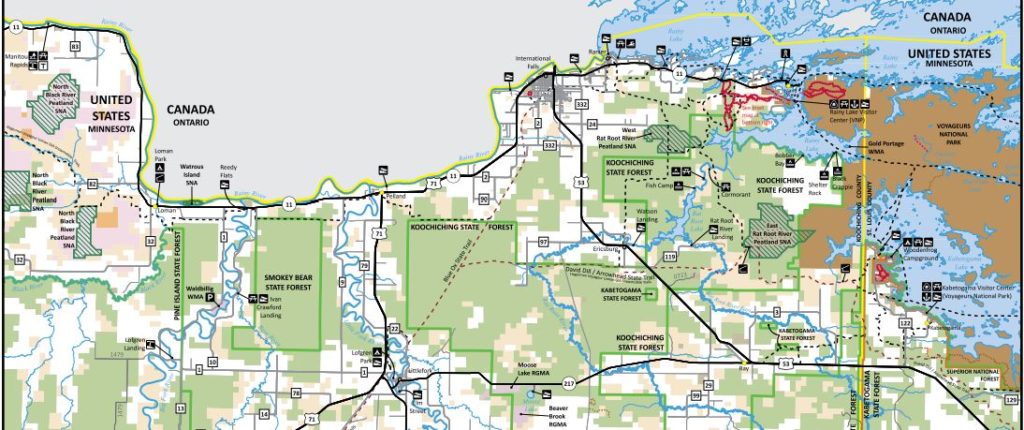
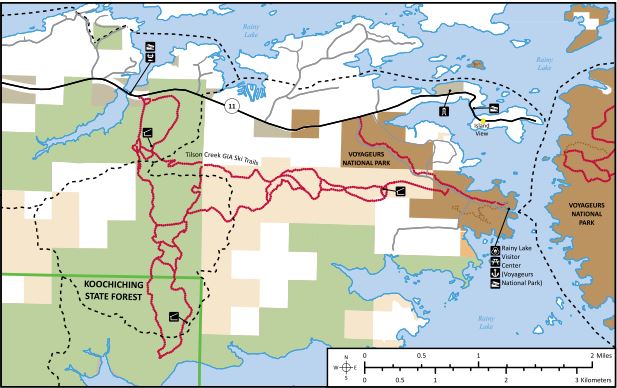
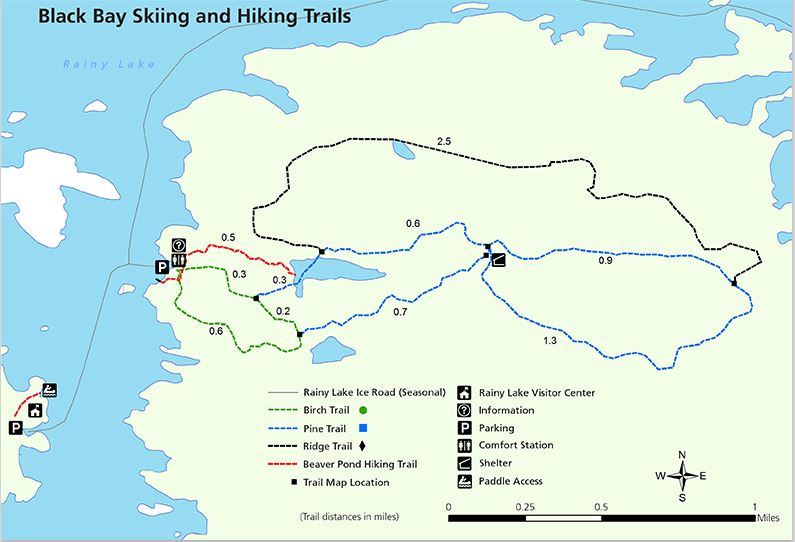
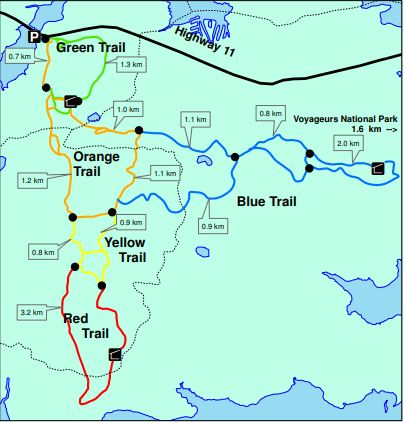
Wilderness Skiing
Having several groomed trails of your choosing in the Rainy River District it is easy to forget that an amazing world exists outside of those trails, with an infinite variety of places waiting to be discovered. Much of the District is unorganized and is on Crown Land. Old logging roads, snowmobile trails, creeks, ponds, and lakes all serve as gateways to new areas to explore. All that is required is an acceptance that you will be the breaking your own trail. In this case wider, back country skis are required. You can ski on your narrow skis that you use for groomed trails, but you will soon be wishing for something wider.
I’ve included a map where I live with just some of the trails I ski as an example of what is available. This could be a map from almost anywhere in the District. Explore and Discover!
